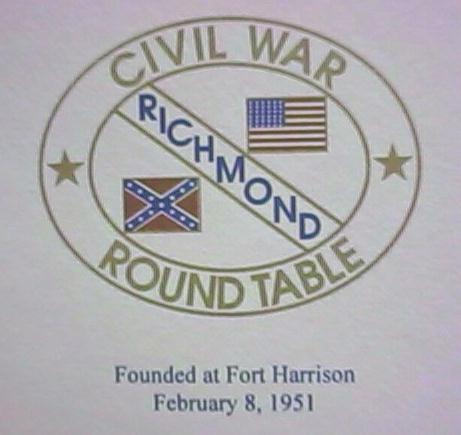


February 2000
R.Danny Witt, President John M.Coski, editor 5500 Ashton Park Way 1201 E.Clay St. Glen Allen, VA 23059 Richmond, VA 23219 FEBRUARY 2000 PROGRAM MARK K. RAGAN UNION AND CONFEDERATE SUBMARINE WARFARE IN THE CIVIL WAR 8:00 p.m., Tuesdav, February, 8, 2000 at the Boulevard United Methodist Church 321 N. Boulevard (corner of Boulevard and Stuart Ave.) Enter basement door from Boulevard side. Mark Ragan is a former hard-hat diver who owns and operates his own two-man submarine. He was one of the divers who located the H. L. Hunley, and is presently working raise that famous boat. His field work and documentary research to led to his first book, The Hunley: Submarines, Sacrifices, and Success in the Civil War, published in 1995. Mr. Ragan's research on the Hunley, kept turning up evidence of other, earlier, submarine experiments by the Southern and Northern navies. He pursued these leads and wrote a book that demonstrates beyond doubt the extent of submarine research and development during the war. His second book, Union and Confederate Submarine Warfare in the Civil War, was published by Savas Publishers in 1999. Review of January Program By Sam Craghead Bookshelves in the American Civil War section are overflowing with works on the lives and experiences of soldiers of that conflict. However, this is not the case with accounts by or of Civil War sailors Bob Schneller's Under The Blue Pennant - the memoir of Ensign John W. Grattan, U.S.N. - helps to correct this disparity. After service with the Forty-seventh Regiment of the New York State National Guard, John Grattan enlisted in the U.S. Navy as an acting ensign. From May 1862, until the first of September 1862, Grattan was clerk to the fleet captain of the North Atlantic Blockading Squadron. On 17 November, he was assigned as clerk to Real Admiral Samuel Phillips Lee, the squadron commander. In this post Grattan was responsible for maintaining all of the correspondence of the admiral, as well as all of the records of the squadron - a duty which placed him in a unique position to write a memoir with a great deal of insight into the events he recounted. John Grattan was a personal friend and great admirer of the famous Lt. William Barker Cushing, whose exploits the Round Table had the pleasure of hearing Dr. Chris Fonvielle recount at the meeting in November. In his memoir, Grattan told of the attack of the Confederate torpedo boat "Squib" upon the "Minnesota," Admiral Lee's flag ship, when she was anchored in the waters of Hampton Roads, at two O'clock in the morning on the ninth of April, 1864: "In a second the frigate was thrown over on her beam ends, the main yard arms touching the water. Hundreds of seamen were thrown violently out of their hammocks; ladders and gratings came crashing down the hatchways; capstan bars, sponges, rammers, shot, and shell were displaced and set rolling about the decks. Amid the greatest confusion and excitement the drums beat to quarters; but owing to the absence of ladders and the extinguishing of all lights by the shock, the officers and crew could not get on deck." The torpedo boat was able to make its escape. Grattan was present during both battles for Fort Fisher in December 1864 and January 1865. Blaming the failure of the first attack on General Benjamin Butler, of whom he was no admirer, he told of taking blockade runners into a trap set after the fort was captured on the second attempt. There were light moments, even in war, and Ensign Grattan described the homespun activities of the officers and men, when they were not on duty. Grattan was with President Abraham Lincoln in Richmond in April 1865 when he visited the Confederate White House and sat in Jefferson Davis' office easy chair. During this visit, Grattan recounted, the officers partook of some strong applejack and one of them declared: "no wonder the rebels fought so well when they could get such stuff to drink. Like his friend, W. B. Cushing, Grattan did not live long after the war. He died on the 15th of November 188 1, in Pittsburgh, Pennsylvania. The Round Table's Golden Anniversary The Richmond Civil War Round Table will celebrate its its fiftieth anniversary in 2001. The RCWRT board voted in October to observe this anniversary by publishing a special edition of an old book that defines our organization and its history. Echoes of 1861-1961 by J. Ambler Johnston, a RCWRT charter member, was produced in a limited private edition of 175 copies in 1970. The book features a tour of the Richmond battlefields and a history of the battles and the battlefields, and sketches of the dignitaries who have toured them. It is also a sketch of Douglas Southall Freeman and the process by which he - with considerable assistance by Johnston - preserved and recorded the history of the Richmond battlefields. The 50th anniversary edition of Echoes will also include a modem tour of the battlefield markers - the so-called "Freeman markers." The RCWRT board will offer more details about the numbers and costs of Echoes as the project proceeds. Last Call for 2000 Dues Editor's note: this "last call" was supposed to be out to members before the February I dues deadline. The editor apologizes for the delay. As a good (adoptive) Richmonder, he blames the snow.
